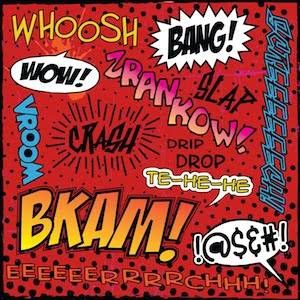
Comic Books Were My Gateway to Reading
This is a guest post by E.H. Kern. She holds a doctorate from a Swedish university and can’t get enough of history, books and music. Her earliest memories involve a comic book and a Dutch troubadour. Occasionally she can be found blogging at The Boomerang (ehkern.wordpress.com). Lives with her husband in South Florida, because sooner or later she would’ve ended up there anyway. Follow her on Twitter @EH_Kern.
_________________________
Whenever we were going on a trip when I was a kid, my mom would take us to buy comic books. My dad was at sea, working on oil tankers traversing the oceans of the globe, so going on a trip usually meant visiting dad at work. For kids aboard a tanker there is little to do that is not dangerous. Except read.
Throughout my childhood and teenage years, comic books were an essential part of my reading experience. I like comic books because they are a fusion of the written word and visual art where each comic book wears the imprint of the artist who created it. Looking back, I can safely say that comic books became a gateway, not only to reading in general, but to heavier reading.
Here’s why.
Growing up in Sweden, I had access to the Swedish translations of American comic books, such as Marvel and DC, as well as the comic books created within the rich traditions of the Netherlands and Belgium. Among my favorite American heroes were Bruce Banner as The Incredible Hulk and the Fantastic Four. In fact, I learned how to read because of the Fantastic Four. I was six years old and I owned a comic book featuring the quartet. I wanted to know what it was about, but my dad wouldn’t read it to me. (Any parent who has attempted reading a comic book out loud can relate to my dad’s reluctance.) So I had to teach myself.
When it came to the Dutch and Belgian comics, my favorites were Henk Kuijper’s sleuth Franka and Roger Leloup’s heroine Yoko Tsuno. Franka lived in the fictional Dutch town of Groterdam where she cracked cases involving everything from ghost ships to stolen art masterpieces. Yoko Tsuno is a Japanese woman living in Belgium, who teams up with TV-producer Vic and cameraman Pol to solve mysteries.
Not only do I appreciate the adventures of Franka and Yoko because of the stories they tell, but because they are drawn in the so-called style of ligne claire (French for “clear line”). In the ligne claire style each frame is drawn with an eye for detail and each line is equally as thick. This technique creates a visual experience similar to a photograph where everything is in focus. Whenever I come across a comic book drawn in this style I can’t resist it. I have to read it.
By reading comic books, at an early age I was exposed to the complexities of what it means to be human. For example, the main conflict of that Fantastic Four issue was the custody battle within the disintegrating marriage of Reed Richards and Sue Storm. To this day, one of my favorite adventures of The Incredible Hulk is Bruce Banner’s struggle to stay conscious when transforming into The Hulk, a striking metaphor for man’s fight against the beast within. A Franka adventure I keep returning to is when on a deserted island, she meets a Dutch billionaire who staged his own death to escape the prison-like existence of being the richest man in the world.
Comic books expanded my literary horizons. I did not know it at the time, but Yoko’s discovery of an alien race living beneath the surface of the Earth was my first encounter with science fiction.
Comic books gave me strong female role models. Franka, Yoko and Sue Storm showed me what women can accomplish, using their intelligence to reach their goals.
Because of what comic books showed me about the potential of fictionalized storytelling and the complexity of characters, when adult-oriented literature came into the picture I was ready for anything. I would say that it’s no coincidence that I discovered Fyodor Dostoyevsky not through one of his classic novels, but through a short story about corpses arguing among each other while buried in their coffins.










